-
 Art of Wellness Acupuncture & Traditional Chinese Medicine (TCM)11704 Wilshire Blvd, Suite 295, Los Angeles, CA, 90025
Art of Wellness Acupuncture & Traditional Chinese Medicine (TCM)11704 Wilshire Blvd, Suite 295, Los Angeles, CA, 90025
myartofwellness@gmail.com310-451-5522 Office Hours
MonClosedTue7:30 am --4 pmWed7:30 am --4 pmThu7:30 am -- 4 pmFri7:30 am -- 4 pmSat7:30 am -- 4 pmSunClosedOur office opens from Tuesdays to Saturdays 7:30 am to 4 pm, will be closed on Memorial day, Independent day, Labor day, Thanksgiving day, Christmas and New year.
-
Recent Posts
- Chinese New Year 2026: Year of the Horse
- Acupuncture and TCM Treatment for Perimenopause Symptoms
- How to Treat Insulin Resistance With Acupuncture and TCM
- How to Treat Metabolic Syndrome With Acupuncture and TCM
- How to Treat Syncope With Acupuncture and TCM
- How to Treat Thoracic Outlet Syndrome With Acupuncture and TCM
- How to Treat Dupuytren’s Contracture With Acupuncture and TCM
- How to Treat Nutcracker Syndrome With Acupuncture and TCM
- How to Treat Rosacea With Acupuncture and TCM
- How to Treat Perioral Dermatitis With Acupuncture and TCM
- Lymphatic Drainage With Acupuncture and TCM
- How to Treat Turf Toe With Acupuncture
- How to Treat Nerve Pain With Acupuncture and TCM
- How to Treat Watery Eyes With Acupuncture and TCM
- How to Treat Ovarian Cysts With Acupuncture and TCM
- How to Treat Dystonia With Acupuncture and TCM
- Sign up to receive news and updates and get my free report:“The Top 10 Reasons to Try Acupuncture”

December 2025 M T W T F S S 1 2 3 4 5 6 7 8 9 10 11 12 13 14 15 16 17 18 19 20 21 22 23 24 25 26 27 28 29 30 31
Acupuncture
How to Treat BPPV (Vertigo) With Acupuncture and TCM
By Qineng Tan, L.Ac., Ph.D. and Xiaomei Cai, L.Ac. Ph.D.

Dizzy when lying down? Waking up dizzy? Head spinning sensation when you move from one position to another? These could be BPPV symptoms. Benign Paroxysmal Positional Vertigo (BPPV) is a common vertigo cause. Acupuncture and TCM offer an alternative or adjunct BPPV treatment to help relieve positional dizziness.
Benign Paroxysmal Positional Vertigo (BPPV) is one of the most common causes of vertigo, a condition characterized by a feeling that the room is spinning.
BPPV is an inner ear disorder that affects the vestibular system, which controls your sense of balance. BPPV causes you to feel dizzy. The words “positional vertigo” in the name refer to the fact that the dizziness happens after you move your head, either by tilting or turning it, or you get dizzy when getting up from laying down.
Unlike some other forms of vertigo, BPPV is considered relatively harmless; hence the word “benign” in the name. However, its sudden and unpredictable nature can be very unsettling, and have a real impact on your daily life.
BPPV occurs when small calcium particles called otoconia, which are normally located in the inner ear, become dislodged and migrate into one of the ear’s semicircular canals. When these particles move with changes in head position, they can disrupt the normal flow of fluid in the canals, sending incorrect signals to the brain about the body’s position. This mismatch between visual and vestibular signals leads to the characteristic symptoms of BPPV.
What Causes BPPV?

In most cases, doctors do not find a clear BPPV cause when patients see them about recurring dizziness. However, it is possible for certain conditions to possibly cause BPPV. These could include:
- Head injury, head trauma
- Migraine headaches, vestibular migraine
- Meniere’s disease
- Labyrinthitis
Migraine associated vertigo is common, and vice versa; people with BPPV are more likely to experience vestibular migraine, or a migraine headache due to problems with the inner ear. Patients who have BPPV treatment in the form of repositioning, as discussed below, may also be more likely to have migraines afterwards.
Top 10 BPPV Symptoms
That dizzy, spinning sensation is the primary, recognizable symptom of vertigo, but when a person has BPPV, there may be other signs, too. These are the most common symptoms of BPPV:
- Dizziness: Sudden and intense episodes of dizziness, often triggered by changes in head position, such as rolling over in bed or tilting your head back.
- Vertigo: A spinning or whirling sensation, as if the room is rotating around you. This sensation is usually brief but can be severe.
- Light-headed: feeling faint or dizzy.
- Nystagmus: Involuntary, rapid eye movements, typically triggered when changing head position. These eye movements are a hallmark of BPPV and can help doctors diagnose the condition. It may feel like you’re seeing wavy lines or objects around you “jumping” or moving.
- Blurred Vision: the inner ear is connected with the eye muscles, so this imbalance can affect vision, and even cause foggy vision, double vision, and/or sensitivity to light.
- Imbalance: Difficulty maintaining balance, especially when getting up from a lying or seated position. This can lead to unsteadiness and an increased risk of falling.
- Nausea: Some people with BPPV may experience nausea or vomiting, particularly during severe vertigo episodes.
- Fatigue: The unpredictability of BPPV attacks and the effort required to maintain balance during episodes can lead to feelings of exhaustion.
- Anxiety: BPPV can cause anxiety, as individuals may fear the sudden onset of vertigo and its potential impact on their daily activities.
- Tinnitus: Some individuals with BPPV may experience ringing in ear or buzzing in the affected ear, or even hearing loss.
BPPV Treatment and Diagnosis
There really are no lab tests that confirm a diagnosis of BPPV. A doctor will usually perform a test called the Dix-Hallpike maneuver, in which you are asked to turn your head and lie down, and then sit up again 20 to 30 seconds later. During this test, the physician will carefully observe for signs of nystagmus, the rapid eye movement that is one of the classic signs of BPPV.
A doctor may perform other tests like an MRI or CT scan to rule out other possible causes of vertigo.
Sometimes, doctors will recommend a wait and see approach, as many times, BPPV symptoms will resolve on their own in a matter of weeks or months.
Benign paroxysmal positional vertigo treatments can include vestibular suppressant medication. Medications for BPPV aim to provide vertigo treatment that reduces symptoms of dizziness and nausea.
Benzodiazepines, like Valium, may be prescribed because they can help reduce acute vertigo and the sensations of motion sickness. These medications can be habit-forming and have side effects. They also have to be reduced gradually, because of withdrawal symptoms.
Antihistamines, like Benadryl, may be recommended, as they can also reduce feelings of nausea.
Anticholinergics are vestibular suppressants that block receptors in the nervous system. They are used to treat many conditions that involve involuntary movement. However, they can cause a lot of side effects and worsen other conditions like prostate problems, irregular heartbeat or rapid heartbeat, glaucoma, dementia, and depression.
None of these medications address the root cause of dizziness.
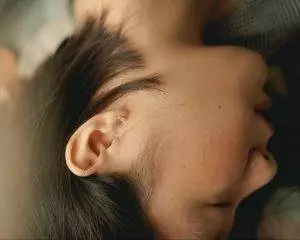
The preferred treatment for BPPV is usually a canalith repositioning procedure (CRP) can be done with one of a few different maneuvers that doctors can perform to try to move the particles in the inner ear that are causing BPPV. These are often helpful in the short term to relieve vertigo, but often patients do have a recurrence of BPPV symptoms again.
For some people, repositioning is not a good option—if you have problems with your cervical spine, or serious cardiovascular problems, for example.
Acupuncture and TCM offer an alternative treatment for BPPV that can relieve dizziness and other vertigo symptoms without any unwanted side effects.
Can Acupuncture Help BPPV?
According to TCM theory, phlegm is one of the pathogenic forces that can take hold in the body, along with things like dampness, dryness, etc. Phlegm builds up when fluids in the body are not being transported and moving the way they should; they get caught in an area and become condensed and thick, causing blockages of energy and movement.
The San Jiao, or “triple burner,” is an important concept used in TCM theory; the San Jiao controls the movement of fluids in the body. In cases of vertigo, phlegm and heat become stagnant due to the malfunctioning of the Jiao. This causes phlegm to be pushed upwards in the body.
In TCM, we may diagnose BPPV and other vestibular problems as having their root cause in a buildup of phlegm in the head that is causing a blockage in the inner ear.
Wind is another pathogenic force that can get into the body and cause problems that seem to come and go. Some cases of dizziness may be due to wind in the head.
Thus, the TCM protocols for BPPV treatment will aim to clear dampness, phlegm, and wind, and get fluids and Qi energy moving again.
Herbs can play an important role in treating vertigo. Chinese herb formulas that warm Yang energy and strengthen the kidneys and spleen can help to clear phlegm.
Use of specific acupoints with acupuncture treatment can help relieve vertigo—sometimes patients feel much less dizziness, even after one treatment. Not only can TCM treatment for BPPV help improve vertigo right away, but regular acupuncture session can help prevent bouts of dizziness from happening.
Acupuncture Near Me for BPPV in Los Angeles, Santa Monica
TCM is a great modality for helping to relieve dizziness due to all types of health conditions, including migraines, POTS, Ehlers-Danlos Syndrome, Meniere’s disease, multiple sclerosis (MS), diabetes, sinus issues, ear infections, and the side effects of medications. Acupuncture can be an excellent alternative for vertigo if other treatments have not helped. Dr. Tan and Dr. Cai at Art of Wellness in West L.A. can help get to the bottom of recurring dizziness, so you can feel steady again.
*This article is for education from the perspective of Traditional Chinese Medicine only. The education provided by this article is not approved by FDA to diagnose, prevent, treat and cure human diseases. It should not stop you from consulting with your physician for your medical conditions. Traditional Chinese Medicine is based on Qi, which is an invisible force that usually cannot be observed by modern science. Because science focuses on testing ideas about the natural world with evidence obtained through observation, these aspects of acupuncture can’t be studied by science. Therefore acupuncture and Chinese herbs are often not supported by double-blind, randomized trials, and they are considered alternative medicine therapies in the United States.
How to Treat Hashimoto’s Disease With Acupuncture and TCM
By Qineng Tan, L.Ac., Ph.D. and Xiaomei Cai, L.Ac., Ph.D.
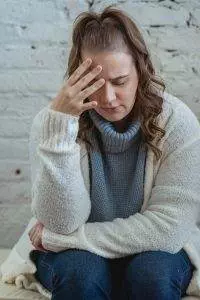
Goiter, enlarged thyroid? Tired all the time, feeling weak, sensitive to cold? Constipation, weight gain, hair loss? These can all be hypothyroidism symptoms. Hashimoto’s disease is an autoimmune disorder that causes low thyroid symptoms. Acupuncture and TCM can offer an alternative hypothyroidism treatment and address Hashimoto’s thyroiditis symptoms.
Recent data shows that hypothyroidism is fairly common. In the U.S., where it was previously thought that about 5% of the population may have some signs of hypothyroidism, more recent research shows that that number is over 10%. While people of all ages can have signs of hypothyroidism, it is most common among women over 50.
The thyroid and the pituitary gland work to release various thyroid hormones that control metabolism and other processes. The primary thyroid hormones are thyroxine (T3) and triiodothyronine (T4); Thyrotropin (TSH) is the hormone that stimulates the production of T3 and T4.
The normal TSH level for most adults is in the range of 0.27 – 4.2 uIU/mL. Lower TSH levels are often a sign that the body is producing too much thyroid hormone, which leads to symptoms of hyperthyroidism, which is often due to Graves disease, which is also an autoimmune thyroid disorder.
When TSH levels are high, there is probably too little thyroid hormone, or low thyroid hormone levels. Hypothyroidism is considered “overt” when a person has high TSH levels and low T4 levels. A person is considered to have subclinical hypothyroidism when their TSH is elevated, but T4 is in the normal range.
Hashimoto’s disease, also known as chronic thyroiditis, is the most common cause of hypothyroidism, but because it is a slowly progressing autoimmune disorder, it can take years for symptoms for thyroid to show up.
Hypothyroidism causes, or risk factors for Hashimoto, include: genetics, changes in hormones during pregnancy, and the presence of other autoimmune diseases. It is possible to have Hashimoto’s thyroiditis and also have another autoimmune condition, such as Rheumatoid arthritis, Celiac Disease, Lupus, or Type 1 Diabetes.
In some cases, hypothyroidism can be caused by an iodine deficiency in the diet. This is rare in the U.S., though, and iodine supplementation is not helpful in cases of hypothyroidism that are not caused by a lack of iodine.
Acupuncture and TCM are excellent modalities for treating all kinds of autoimmune disorders, because they work holistically to treat both the root causes of the problem, and hypothyroid symptoms.
Top 10 Hashimoto Disease Symptoms
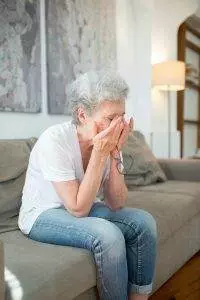
Signs of thyroid issues can take a long time to become severe enough that people notice them and seek diagnosis and treatment. Hypothyroidism symptoms can just seem like “normal” fatigue or other signs of aging.
Sometimes when people visit their primary care doctor, and they run a typical panel of blood tests, thyroid hormone levels are still in the normal range, so no treatment is recommended.
However, hypothyroidism symptoms typically come on gradually, and will likely get worse with time, as the disease progresses.
Hashimoto’s Disease Symptoms include:
- Fatigue, sluggishness, tired all the time
- Drowsiness, sleepy all the time
- Increased sensitivity to cold, feel cold all the time
- Dry skin, brittle nails, hair loss, puffy face
- Muscle pain, muscle stiffness, muscle weakness, joint pain, stiff joints
- Swollen thyroid, enlarged thyroid gland, goiter, swollen tongue
- Memory problems, difficulty concentrating, foggy head
- Change in menstrual cycle, irregular menstruation, heavy bleeding during period
- Weight gain
- Depression, mental health problems
If hypothyroidism is not treated, it can lead to serious complications. These may include: heart problems or cardiovascular diseases, like irregular heartbeat (arrhythmia) and high cholesterol.
Hashimoto’s can cause problems with sexual function, libido, and fertility in both men and women.
In rare cases, people with untreated low thyroid levels can develop Myxedema. Myxedema is the term for advanced, severe hypothyroidism, which can lead to:
- Low blood pressure
- Low heart rate
- Low blood sodium levels
- Low blood oxygen levels
- Low body temperature (hypothermia)
- Mental confusion
In extreme cases, Myxedema can lead to a health crisis in which a person may go into shock, a coma, or seizures. Myxedema crisis requires immediate emergency care.
Hypothyroidism can develop slowly, with minimal symptoms. However, it is important to get proper diagnosis and treatment for Hashimoto’s thyroiditis. As time goes on, untreated hypothyroidism can lead to more complications.
Medical Treatment for Hashimoto’s Disease
Getting a diagnosis for Hashimoto’s disease will usually involve a series of blood tests. As an autoimmune disorder, Hashimoto involves the production of antibodies that mistakenly attack healthy cells. In the case of Hashimoto’s thyroiditis, an antibody test may show that the immune system is making TSO antibodies. Thyroid peroxidase (TSO) a protein that is vital to the production of thyroid hormone.
In addition, blood tests will show if there is elevated TSH and/or low levels of T4. If a person has symptoms, or an enlarged thyroid gland, and high TSH levels, then a diagnosis of Hashimoto’s may be made, whether or not the T4 levels are low.
An ultrasound can indicate that there is swelling or inflammation in the thyroid gland.
Hypothyroidism Medication
The usual treatment for Hashimoto’s disease is hormone replacement. Levothyroxine, under the brand names Levoxyl, or Synthroid, is usually given in pill form. This hypothyroid medication mimics the action of T4 hormone.
For many patients, medications for low thyroid will help to stabilize the TSH and T4 levels, and symptoms will improve. However, for some people, the continued autoimmune disorder process continues to cause symptoms, even when thyroid hormone levels are in the normal range.
In these cases, doctors may recommend surgery. A thyroidectomy involves the removal of some or all of the thyroid gland. After a thyroid surgery, a person will need to continue taking thyroid hormone replacement medication, as they will not produce any without the thyroid gland.
Acupuncture and TCM treatment offer an alternative or adjunct therapy for Hashimoto’s disease, which can help improve immune function and address symptoms.
Can Acupuncture Help Hashimoto’s?
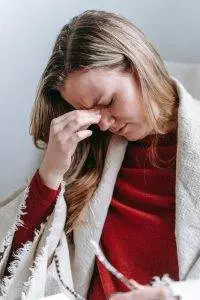
Acupuncture works by harmonizing the Qi (life force energy) of the organ systems of the body. When Qi is out of balance, then some bodily processes happen in excess, and others are deficient. A TCM practitioner observes and listens carefully to each person’s individual experience of symptoms to discover which organs are out of balance.
In the case of hypothyroidism and Hashimoto’s, deficiency of Qi and blood can be building up over a long period of time, and gradually begin to impact organs: mainly, the kidneys, spleen, and heart.
For a while, while the condition is still what conventional medicine considers to be subclinical hypothyroidism, the spleen Qi is weak, and causes some symptoms, like weakness and fatigue.
Then, as the situation progresses, the kidney Qi is affected, and more symptoms begin to occur. Yang Qi is not able to warm the organs enough, so dampness and cold begin to accumulate. This causes symptoms like constipation, swollen joints, brain fog, and memory problems.
Chronic kidney and liver qi deficiency can cause menstrual problems, and infertility.
If the problem continues, then the heart is affected, too, and cardiovascular symptoms begin to arise, like palpitations, respiratory problems, and low blood pressure.
The acupuncturist deduces from the pattern of symptoms which organs are affected, and then uses acupuncture treatment, herbs, and other modalities like cupping or moxibustion to bring more energy to depleted areas and help nourish them.
Can TCM cure hypothyroidism? Not exactly, but research has shown that acupuncture is a safe and effective treatment for thyroid disorders, whether it is used as an alternative medicine for Hashimoto’s disease, or as an adjunct therapy.
Case studies have shown that regular acupuncture treatment can help stabilize thyroid hormone levels, slow the progression of the autoimmune disease, reduce symptoms, and improve quality of life.
For those who are trying to conceive and are struggling with infertility issues due to thyroid disorders, acupuncture can be a holistic treatment that helps balance hormones and improve fertility. Acupuncture treatment may help prevent miscarriage due to autoimmune conditions.
Acupuncture can also be helpful for pain management after a thyroidectomy procedure.
Acupuncture Near Me for Hashimoto’s Disease – West Los Angeles Area
Acupuncture is an excellent modality for helping to treat many autoimmune diseases and thyroid conditions, including Graves disease, hyperthyroidism, and chronic fatigue syndrome. TCM can also help with menopause and perimenopausal symptoms, which often occur concurrently with hypothyroidism in women over 50. Acupuncture can also help with all kinds of mental health problems like depression and anxiety, which may be related to underlying physical conditions.
*This article is for education from the perspective of Traditional Chinese Medicine only. The education provided by this article is not approved by FDA to diagnose, prevent, treat and cure human diseases. It should not stop you from consulting with your physician for your medical conditions. Traditional Chinese Medicine is based on Qi, which is an invisible force that usually cannot be observed by modern science. Because science focuses on testing ideas about the natural world with evidence obtained through observation, these aspects of acupuncture can’t be studied by science. Therefore acupuncture and Chinese herbs are often not supported by double-blind, randomized trials, and they are considered alternative medicine therapies in the United States.
How to Treat POTS With Acupuncture and TCM
By Qineng Tan, L.Ac., Ph.D. and Xiaomei Cai, L.Ac., Ph.D.

Do you often feel shaky, like you’re fainting, or experience dizziness, especially when you’re getting up from sitting down or lying down? Do you feel like you have a rapid heartbeat, or shortness of breath? Postural orthostatic tachycardia syndrome, known as PoTS syndrome, or POTS, is a condition that causes unstable blood pressure when changing positions. Acupuncture and TCM can help relieve dizziness and other symptoms of POTS.
Postural tachycardia syndrome (or postural orthostatic tachycardia syndrome) is a chronic disorder related to the autonomic nervous system that causes people to experience dizziness and increased heart rate when they move into an upright position; this is known as orthostatic intolerance, which is a type of dysautonomia.
POTS syndrome is fairly common, affecting up to 3 million people in the U.S. POTS occurs more often in people assigned female at birth, and often first shows up during the teenage years.
The most common symptom of POTS is feeling light-headed when changing your position from sitting to standing, or when getting up from lying down.
Whenever we have been sitting or lying down for a while, blood pools in the lower parts of the body. When we get up, the autonomic nervous system starts a series of actions to move blood back up into the top half of the body. This involves squeezing blood vessels, and releasing adrenaline and norepinephrine, to make the heart beat faster.
When a person has POTS, more blood tends to pool in the legs, and the nervous system process doesn’t cause the normal, quick response from the blood vessels, so more hormones are released, which can cause the person’s heart rate to increase, and a dizzy, faint feeling.
Medical science has not yet discovered exactly what causes POTS, but there are different characteristics that allow for categorizing these different types of POTS syndrome:
- Neuropathic POTS – damage to small fiber nerves that control blood vessel constriction in the abdomen and limbs
- Hyperadrenergic POTS – when a person has elevated levels of norepinephrine
- Hypovolemic POTS – when a person has unusually low blood levels
- Secondary POTS – when POTS symptoms are related to another condition that causes neuropathy, such as Lyme disease, diabetes, or autoimmune disorders like Lupus or celiac disease.
While POTS is not rare, it can be difficult to get a diagnosis, because the criteria can be vague, and the symptoms can so often be related to other conditions, or just seem “normal.”
For many people, POTS is truly debilitating and can have a serious, negative impact on daily life. It can also contribute to feelings of anxiety and depression. Acupuncture and TCM offer an adjunct or alternative treatment for POTS that can help with dizziness, irregular heartbeat, digestive problems, muscle weakness, migraines, trouble sleeping, and other symptoms, all at the same time.
Top 10 POTS Symptoms
The primary symptoms of POTS are related to the cardiovascular system: rapid heartbeat, and dizziness. However, there can be many other POTS symptoms.
- Irregular heart rate, rapid heart rate, fast heartbeat, chest pain, heart palpitations
- Dizziness, especially when standing up or getting up from lying down, feeling faint
- Breathing problems: hyperventilating, bronchial asthma, shortness of breath
- Constipation, diarrhea, nausea, abdominal pain
- Muscle weakness, muscle pain, tremor
- Skin rash, flushed face, flushing, sweating
- Migraine headaches
- Cognitive issues, brain fog, difficulty concentrating
- Trouble sleeping
- Frequent urination, nocturia
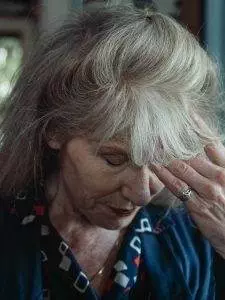
Other symptoms of POTS may include: tinnitus (ringing in the ears), blurred vision, red or purple appearance of the legs when standing up, and a “jittery” feeling or general nervousness.
As with many syndromes, different people will experience different combinations of symptoms. While dizziness and rapid heartbeat are the signs most commonly associated with POTS, many people with POTS will also suffer from abdominal pain and gastrointestinal problems, perhaps without realizing there is a correlation.
POTS symptoms may resemble many other conditions, such as:
- Chronic fatigue syndrome, ME/CFS
- Graves disease
- Other heart conditions that involve tachycardia
- Anemia
- Stroke
- Epilepsy
- Adrenal fatigue
- Drug use
- Eating disorders
- Benign paroxysmal positional vertigo
- Ménière’s disease
Because POTS is often misunderstood or misdiagnosed, many patients will be offered medications to manage headaches, vertigo, or depression, which may not offer much relief.
Medical Treatment for POTS
As there is no definitive cure for POTS, Postural orthostatic tachycardia syndrome treatments typically aim to manage symptoms and improve quality of life.
Dietary modifications are a fundamental component of POTS management. Adequate daily fluid intake is crucial. A diet that includes plenty of salt helps maintain blood volume, aiding blood flow to vital organs. Patients are typically advised to avoid alcohol and carefully monitor caffeine intake, as these substances can exacerbate symptoms.
Exercise is gradually introduced, often starting in reclined or horizontal positions, with the goal of increasing exercise tolerance over time. Physical therapy helps retrain the autonomic nervous system, enhancing blood circulation.
Compression garments can help reduce blood pooling, and specific postures while sitting or sleeping may alleviate symptoms. Identifying triggers such as prolonged sitting, heat, or certain drugs allows for better symptom control. Regular monitoring of blood pressure and pulse, along with adequate sleep hygiene, aids overall well-being.
While no single pharmacological solution is universally effective, some medications may be prescribed based on individual symptoms. These may help to improve blood volume, aid sodium retention, reduce heart rate, and enhance blood vessel constriction.
While POTS symptoms may intermittently improve with medications and lifestyle modifications, the underlying cause of POTS may persist. Acupuncture and TCM treatment can provide a holistic solution for individuals living with POTS, which may help to address the root causes of this syndrome.
Can Acupuncture Help POTS?
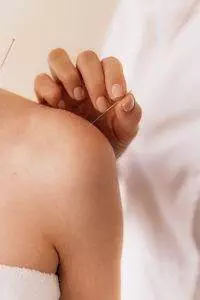
POTS is a kind of Dysautonomia; this is a general term that describes conditions that involve malfunctioning of the autonomic nervous system. This causes people’s bodies to have problems with regulating the sorts of functions that are typically automatic, like the beating of the heart, circulation of blood, breathing, and temperature control.
Western medicine offers some treatments that can help address individual symptoms of dysautonomia, but it does not have a way of treating the root of the problem. It can be difficult to get proper treatment, because people who suffer from POTS and other kinds of dysautonomia often seem reasonably healthy, and their complaints—dizziness, headaches, mental health problems—seem vague.
Acupuncture and TCM have been used to treat these kinds of problems for centuries. Acupuncture treatment can help provide positive effects on the subtle communications of the nervous system, as well as the heart rate, and physiological symptoms of anxiety. According to TCM theory, several organ systems may be involved and need support: not only the heart, but also the kidneys or spleen.
Studies have shown that acupuncture for dysautonomia can help relieve symptoms like heart palpitations, insomnia, and digestive problems.
A qualified acupuncturist is also well-versed in nutrition and can offer more detailed information regarding dietary and lifestyle changes that can help each individual patient. Your TCM provider will spend time learning more about you, so that they can offer personalized advice.
Acupuncture Near Me for POTS in West Los Angeles
TCM and acupuncture can help people with all types of autoimmune disorders, nerve disorders, and conditions involving fatigue and dizziness that may be difficult to solve with conventional methods. Acupuncture works on a deeper, more subtle level to help address complex syndromes. If you are regularly experiencing trouble with feeling light-headed, having unexplained headaches and sleep problems, it may be time to seek a more holistic alternative treatment.
*This article is for education from the perspective of Traditional Chinese Medicine only. The education provided by this article is not approved by FDA to diagnose, prevent, treat and cure human diseases. It should not stop you from consulting with your physician for your medical conditions. Traditional Chinese Medicine is based on Qi, which is an invisible force that usually cannot be observed by modern science. Because science focuses on testing ideas about the natural world with evidence obtained through observation, these aspects of acupuncture can’t be studied by science. Therefore acupuncture and Chinese herbs are often not supported by double-blind, randomized trials, and they are considered alternative medicine therapies in the United States.
How To Treat Psoriasis With Acupuncture and TCM
By Xiaomei Cai, L.Ac., Ph.D. and Qineng Tan, L.Ac., Ph.D.
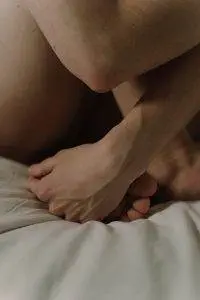
Rash, scaly skin, itchy skin? These could be signs of psoriasis, a chronic skin condition that causes skin to form in thick, scaly, discolored patches, especially on the elbows and knees. Acupuncture and TCM treatment can help relieve psoriasis and address the root causes of this autoimmune skin disease.
Autoimmune disorders stem from the body’s immune system malfunctioning. In the case of psoriasis, the body produces too many skin cells, forming thick scales, known as “plaques,” or a bumpy rash.
As with other conditions that involve skin rashes or other skin problems—like vitiligo, eczema, dermatitis, scleroderma, celiac disease, and lupus—psoriasis tends to flare up periodically, becoming worse for a few weeks or months at a time, and then improving. A psoriasis flare up happens because of widespread inflammation.
What Causes Psoriasis Flare Ups?
Getting a cut or burn on your skin can trigger a psoriasis flare up.
So can infections like a staph infection, strep infection, helicobacter pylori bacterial infection (which can also cause stomach ulcers), or chlamydia.
Viral infections like HIV and hepatitis C can trigger psoriasis. Fungal infections like candida, or yeast infections, can also trigger a psoriasis flare up.
Psoriasis affects millions of people, of all ages. Psoriasis rash can cause intense itching (pruritus), so much so that it can affect a person’s ability to concentrate in daily life and can also have a negative impact on sound sleep.
Medical research has not yet discovered exactly what causes psoriasis, but it may be partly due to genetics and partly due to environmental factors. It is not uncommon for a person to have psoriasis and also have another autoimmune condition, such as lupus, celiac disease, Crohn’s disease or inflammatory bowel disease (IBD), multiple sclerosis (MS), or autoimmune thyroid disease.
Acupuncture and TCM are excellent modalities for helping to relieve the symptoms of skin conditions like psoriasis and many autoimmune disorders. Acupuncture and herbs can help relieve itchy rashes and also help to improve the functioning of the immune system. Acupuncture treatment can also help with the emotional and psychological toll of dealing with psoriasis.
Top 5 Types of Psoriasis
Plaque psoriasis is by far the most common type of psoriasis, accounting for about 80% of cases. Other types of psoriasis are more rare and can be very serious.
- Plaque psoriasis or Psoriasis vulgaris – the most common type of psoriasis; thick scales that are red or pink with a silvery coating on them. These patches, or plaques, can itch intensely.
- Guttate psoriasis – small red or pink bumps that appear suddenly, covering the torso, arms, and/or legs. This condition sometimes clears up and does not return. In some cases, though, it can keep coming back, or later turn into plaque psoriasis. Guttate psoriasis may be triggered by infections, like strep throat.
- Pustular psoriasis – this is a rash of painful bumps that are filled with pus. Generalized pustular psoriasis is an extreme version of this condition, which can quickly cover the whole body and be accompanied by other symptoms like fever, headache, and muscle weakness. Generalized pustular psoriasis is a serious condition requiring medical care.
- Inverse psoriasis or Intertriginous psoriasis – develops in areas where skin folds upon itself, like armpits and around the genital area
- Erythrodermic psoriasis – usually develops as a more severe condition after a person has already been struggling with psoriasis. The skin becomes very red and appears to be burned. The person will feel very ill, with fever and chills and a rapid heart rate. Requires immediate medical attention.
Psoriasis is not only intensely uncomfortable, but the scaly skin can also have a significant impact on a person’s confidence in their appearance. These factors can mean that having psoriasis can have a negative effect on a person’s mental health and emotional health.
Acupuncture, when used as an adjunct therapy for psoriasis and other autoimmune conditions can help address anxiety, depression, and mood disorders, as well as helping with physical symptoms.
Medical Treatments for Psoriasis
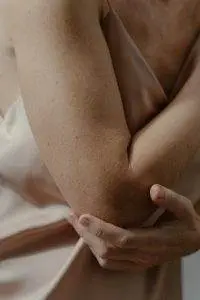
Conventional treatment for psoriasis aims to help slow down the overproduction of skin cells and relieve pain and itching.
Topical Medications for Psoriasis
Topical products are applied directly to the skin.
- Corticosteroids: Frequently prescribed for mild to moderate psoriasis, available in various forms like oils, creams, lotions, etc.
- Vitamin D Analogues: Synthetic forms of vitamin D that slow skin cell growth, used alone or with corticosteroids.
- Retinoids: Available as gel or cream, they reduce skin cell growth and may cause skin irritation and sensitivity to light.
- Calcineurin Inhibitors: Calm the rash and reduce scaly buildup, useful in areas of thin skin.
- Salicylic Acid: Reduces scaling of scalp psoriasis and prepares the scalp to absorb medication more easily.
- Coal Tar: Reduces scaling, itching, and inflammation, available in various forms like shampoo, soap, cream, and oil.
Oral or Injected Medications for Psoriasis
Systemic medications may work on the immune system or on skin cell production to help relieve psoriasis.
- Steroids: Injection of triamcinolone into small, persistent psoriasis patches.
- Retinoids: Pills to reduce skin cell production, not recommended during pregnancy.
- Biologics: Injected drugs that alter the immune system to improve symptoms in moderate to severe psoriasis.
- Methotrexate: Weekly oral dose to decrease skin cell production and suppress inflammation.
- Cyclosporine: Oral calcineurin inhibitor for severe psoriasis.
- Treatment approach based on needs and psoriasis severity.
- Start with milder treatments and move on to stronger ones if necessary.
- Pustular or erythrodermic psoriasis may require stronger systemic medications.
Phototherapy exposes the skin to ultraviolet light under a dermatologist’s supervision. UVB can help slow down cell production. Light therapy may use lamp units with bulbs, or a laser may be used to target very specific areas of affected skin.
Can Acupuncture Help Psoriasis?
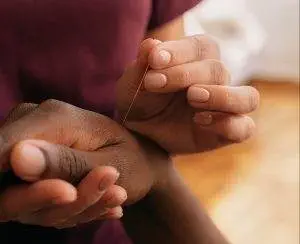
In TCM, elemental factors like heat, wind, dampness, dryness, and so on, are considered to act as pathogens, having a negative effect on bodily systems when they are either in excess or deficient.
According to TCM theory, the root causes of psoriasis may be related to pathogenic factors of excessive heat and dryness. Heat, as a pathogen, can cause redness and itchy skin. Wind can cause dryness of the blood. These conditions in combination can lead to stagnant blood and a fiery heat building up. TCM classifications for diagnosis related to psoriasis would include:
- Blood heat
- Blood stasis
- Blood dryness
- Blood deficiency
An individual, depending on their specific presentation of skin rash and other symptoms, may be diagnosed with a combination of these factors.
In Chinese medicine, the skin and the lungs are connected, with the skin being the outward presentation of what is going on in the lungs. So, acupuncture treatment for psoriasis may focus on strengthening lung Qi.
In other cases, the large intestine may be related; because of dryness, it may not be receiving enough fluid to be able to do the job of moving toxins out of the body.
In some cases, it may be that intense emotions are affecting the liver, causing blood stagnation due to stress. Liver Qi stagnation can cause overheating and for blood to “overflow” from vessels, causing red bumpy rashes.
Thus, herbal remedies and acupuncture treatment will often aim to clear heat, cool the blood, and improve circulation. Many herbs are helpful for this, as well as for helping to reduce inflammation and soothe dryness and itching.
Chinese medicine herbal preparations have been shown by modern scientific studies to inhibit immune-inflammatory reactions, regulate Th cells, and mediate the formation of skin lesions.
Review of scientific studies of TCM for psoriasis have shown that it can be effective for reducing the severity of skin lesions and help prevent recurrences of flare ups.
Acupuncture Near Me for Psoriasis in West Los Angeles
Psoriasis is a painful skin condition that requires special treatment. As an autoimmune condition, psoriasis needs to be addressed on a deeper level, as opposed to simply trying to relieve the itchy, scaly rash on the skin’s surface. TCM offers a holistic way of treating both skin diseases and autoimmune disorders that can bring deep relief. Consider seeking acupuncture as an adjunct treatment for psoriasis.
*This article is for education from the perspective of Traditional Chinese Medicine only. The education provided by this article is not approved by FDA to diagnose, prevent, treat and cure human diseases. It should not stop you from consulting with your physician for your medical conditions. Traditional Chinese Medicine is based on Qi, which is an invisible force that usually cannot be observed by modern science. Because science focuses on testing ideas about the natural world with evidence obtained through observation, these aspects of acupuncture can’t be studied by science. Therefore acupuncture and Chinese herbs are often not supported by double-blind, randomized trials, and they are considered alternative medicine therapies in the United States.
How to Treat CRPS With Acupuncture and TCM
By Qineng Tan, L.Ac., Ph.D. and Xiaomei Cai, L.Ac., Ph.D.

Chronic pain, changes in skin temperature, and swelling in a specific limb or body part? Pain, swollen limbs, edema and inflammation after a seemingly minor injury? These could be signs of a condition known as Complex Regional Pain Syndrome (CRPS). Acupuncture and TCM can help relieve chronic pain due to CRPS.
CRPS is a relatively rare condition that usually causes pain and inflammation in an arm or leg. It most often occurs after someone experiences an injury to a limb, or has surgery on one of their limbs. The painful area may be swollen, turn red and hot sometimes, and blue and cold at other times.
CRPS is marked by pain that seems disproportionate to the injury or outside stimulus. For example, a person with CRPS may feel severe pain when the affected area is touched lightly, or when a breeze blows. While CRPS is not fully understood by medical science, it is generally considered to be a neurological disorder.
While most cases of CRPS do improve in the long run, there may be a long period of time during which the injured area seems to be getting more inflamed.
CRPS pain may worsen and spread to involve more of the affected limb. In some cases, the pain may even be “mirrored” in the opposite limb. This is partially why CRPS is theorized to be caused by problems with the nervous system.
Sometimes CRPS manifests without any evidence of nerve damage. This condition is known as CRPS-I, or Reflex Sympathetic Dystrophy Syndrome. (RSD or RSDS).
Some cases of CRPS can be associated with proven nerve damage; this is called “causalgia,” or CRPS-II.
Conventional Western medicine approaches primarily focus on managing symptoms with pain medications and physical therapy. In some cases, CRPS pain can be so severe that it causes disability, as the person cannot use their limb normally in daily activities.
Traditional Chinese Medicine (TCM) and acupuncture can help address the root causes of CRPS. Acupuncture and TCM offer a holistic approach to relieve pain and enhance overall well-being.
Top 5 Symptoms of Complex Regional Pain Syndrome (CRPS)

CRPS symptoms can change. A CRPS flare up may last days or weeks, when pain and swelling get worse. Sometimes, the pain may seem to come out of nowhere; other times, it may be triggered by exertion, stress, or other factors.
- Intense and prolonged pain: Individuals with CRPS experience severe and persistent pain that may seem disproportionate to the initial injury or cause. There may be “pins and needles” or a burning sensation. Light contact with something may cause severe pain; this phenomenon is known as “allodynia.” Or something that would usually cause mild pain, like a pin prick, causes severed pain; this is called “hyperalgesia.”
- Changes in skin temperature and color: The affected area may become warmer or cooler compared to the surrounding areas, and skin may appear blotchy, pale, red, or blue or gray.
- Swelling and sensitivity: Swelling, edema, and increased sensitivity to touch or even a slight breeze are common symptoms of CRPS.
- Limited range of motion: Stiffness, muscle weakness, and difficulty moving the affected limb or body part may occur. There may be tremors or jerky motions of the limb.
- Changes in skin texture, hair and nail growth: Abnormal hair and nail growth patterns, such as excessive hair growth or brittle nails, may develop in the affected area. The skin may become thinner or thicker, or may be shiny or scaly.
CRPS may cause unusually heavy sweating in the affected area, or cause there to be a total absence of sweating in the area.
Medical Treatment for CRPS
In the realm of conventional medicine, Complex Regional Pain Syndrome (CRPS) is understood as a multifaceted condition that often arises following an injury or trauma to a limb or body part. While the exact cause of CRPS is not fully understood, it is believed to involve abnormal responses of the central and peripheral nervous systems. Nerve damage, inflammation, and changes in blood flow are thought to play a role in the development of CRPS.
Certain risk factors may increase an individual’s susceptibility to the condition, such as a history of fractures, surgery, or repetitive motion injuries. Additionally, psychological factors and genetic predisposition may contribute to the development of CRPS.
CRPS can be triggered by a variety of factors, including surgery, immobilization, infections, emotional stress and trauma.
Diagnostic testing for CRPS may include a bone scan, x-rays, MRI, and a sweat production test.
Medications recommended may include pain relievers, corticosteroids to help bring down inflammation, and nerve blocking injections. Low doses of ketamine are sometimes used to help relieve pain. Topical analgesics may help reduce sensitivity in the affected area, as may heat therapy.
Other therapies for CRPS may include biofeedback and transcutaneous electrical nerve stimulation (TENS). Mirror therapy, in which a person stands or sits in front of a mirror set-up that tricks the brain into thinking it sees the injured limb working the way the healthy limb does, can be helpful for retraining the nervous system.
Acupuncture treatment for CRPS can work on multiple levels to help relieve pain, improve motor function, reduce inflammation, help heal nerves, and reduce stress.
Can Acupuncture Help CRPS?
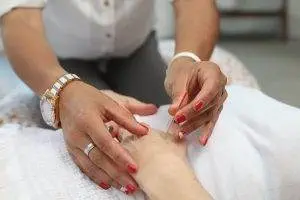
In Traditional Chinese Medicine (TCM), Complex Regional Pain Syndrome (CRPS) is understood as a disruption in the flow of Qi (energy) and Blood in the affected area, leading to pain and dysfunction. According to TCM theory, the underlying causes of CRPS are often related to the stagnation of Qi and Blood, as well as the blockage of meridians (energy channels) that run through the affected limb or body part. TCM treatments aim to restore the smooth flow of Qi and Blood, harmonize the body’s internal balance, and alleviate pain.
Acupuncture, a key component of TCM, is believed to stimulate specific acupoints along the meridians, helping to regulate the nervous system’s response and promote healing. Chinese herbal medicine is also commonly used in TCM to support the treatment of CRPS by addressing underlying imbalances and promoting overall well being. By addressing both the physical and energetic aspects of the condition, TCM aims to restore harmony and alleviate pain in individuals with CRPS.
One study looked at two soldiers whose upper extremities were injured in combat and were later diagnosed with CRPS. When conventional methods did not help relieve pain, they were given one or two acupuncture treatments per week for a few weeks. They had 80% improvement in pain and functionality and with no recurrence at a 20-month follow up.
An individual case study of a 34-year-old with CRPS showed improvement in pain and emotional well-being after a series of acupuncture treatments.
When dealing with Complex Regional Pain Syndrome (CRPS), incorporating certain lifestyle changes, behavioral adjustments, dietary modifications, and home remedies can be beneficial in managing the condition. Here are some recommendations:
Stress Management: Practicing stress-reducing techniques such as deep breathing exercises, meditation, and mindfulness can help alleviate CRPS symptoms. Stress management techniques promote relaxation and can positively impact pain perception.
- Gentle Exercise: Engaging in low-impact exercises like walking, swimming, or yoga can help improve blood circulation, maintain joint flexibility, and reduce muscle stiffness. It is important to consult with a healthcare professional or physical therapist to determine the most appropriate exercise program for your specific situation.
- Heat and Cold Therapy: Applying heat packs or cold compresses to the affected area may provide temporary relief from pain and inflammation. Experiment with both methods to see which works best for you. Remember to protect your skin and avoid extreme temperatures.
- Balanced Diet: Maintaining a healthy and well-balanced diet is crucial for overall well-being. Include nutrient-rich foods such as fruits, vegetables, whole grains, lean proteins, and healthy fats. Avoid excessive consumption of processed foods, refined sugars, and caffeine, as they may contribute to inflammation and worsen symptoms.
- Adequate Hydration: Staying hydrated is important for promoting optimal bodily function and supporting overall health. Aim to drink an adequate amount of water throughout the day to keep your body hydrated and support proper circulation.
- Stress Reduction: CRPS symptoms can be exacerbated by stress. Engaging in activities that promote relaxation, such as hobbies, listening to soothing music, spending time in nature, or engaging in creative outlets, can help reduce stress levels and improve overall well-being.
- Sleep Hygiene: Getting sufficient and quality sleep is essential for managing chronic pain conditions. Establish a regular sleep routine, create a comfortable sleep environment, and practice good sleep hygiene habits like avoiding electronic devices before bed.
It’s important to note that these lifestyle changes, behavioral adjustments, dietary modifications, and home remedies should complement your comprehensive treatment plan and be tailored to your individual needs. Consult with a healthcare professional or a qualified practitioner of Traditional Chinese Medicine (TCM) for personalized guidance and recommendations based on your specific condition and symptoms.
Acupuncture Near Me for CRPS in Los Angeles and Santa Monica
At Art of Wellness Acupuncture in West L.A., we have over 35 years of experience treating neurological conditions and chronic pain of all kinds. Acupuncture is a modality that is particularly suited to treating conditions like CRPS, where it may be difficult to find relief through conventional treatment methods. If you are experiencing excessive pain in one of your limbs, with temperature sensitivity and inflammation, it may be worth seeking out alternative treatment with TCM.
*This article is for education from the perspective of Traditional Chinese Medicine only. The education provided by this article is not approved by FDA to diagnose, prevent, treat and cure human diseases. It should not stop you from consulting with your physician for your medical conditions. Traditional Chinese Medicine is based on Qi, which is an invisible force that usually cannot be observed by modern science. Because science focuses on testing ideas about the natural world with evidence obtained through observation, these aspects of acupuncture can’t be studied by science. Therefore acupuncture and Chinese herbs are often not supported by double-blind, randomized trials, and they are considered alternative medicine therapies in the United States.